The FBI’s takedown of the LockBit ransomware group last week came as LockBit was preparing to release sensitive data stolen from government computer systems in Fulton County, Ga. But LockBit is now regrouping, and the gang says it will publish the stolen Fulton County data on March 2 unless paid a ransom. LockBit claims the cache includes documents tied to the county’s ongoing criminal prosecution of former President Trump, but court watchers say teaser documents published by the crime gang suggest a total leak of the Fulton County data could put lives at risk and jeopardize a number of other criminal trials.
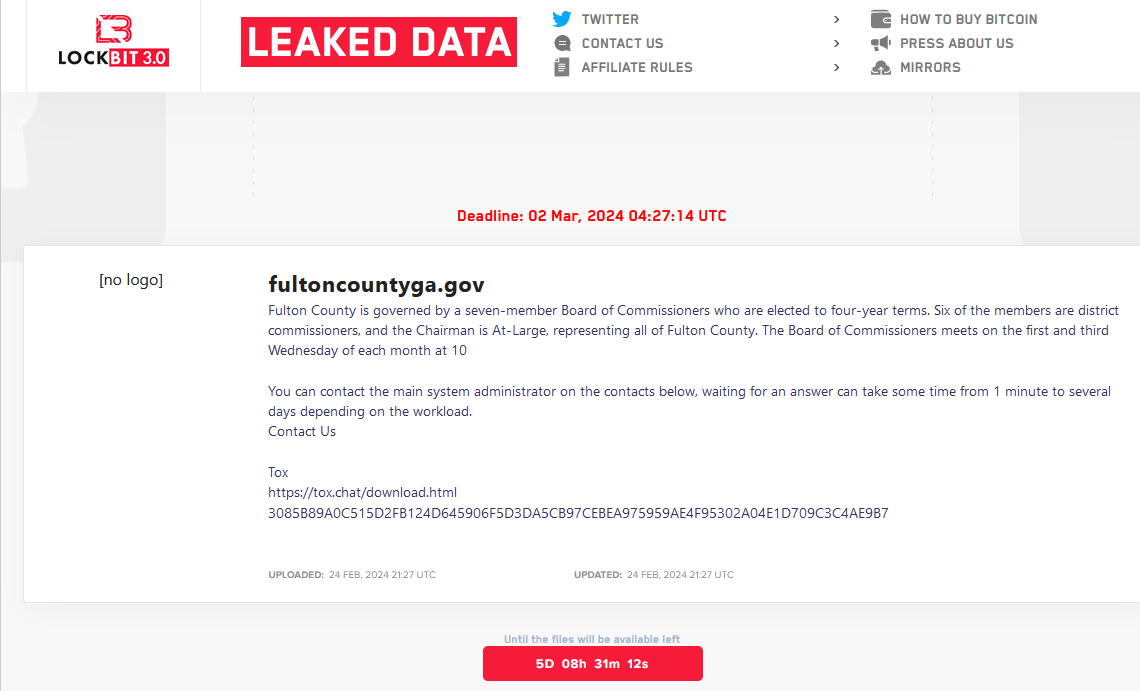
A new LockBit website listing a countdown timer until the promised release of data stolen from Fulton County, Ga.
In early February, Fulton County leaders acknowledged they were responding to an intrusion that caused disruptions for its phone, email and billing systems, as well as a range of county services, including court systems.
On Feb. 13, the LockBit ransomware group posted on its victim shaming blog a new entry for Fulton County, featuring a countdown timer saying the group would publish the data on Feb. 16 unless county leaders agreed to negotiate a ransom.
“We will demonstrate how local structures negligently handled information protection,” LockBit warned. “We will reveal lists of individuals responsible for confidentiality. Documents marked as confidential will be made publicly available. We will show documents related to access to the state citizens’ personal data. We aim to give maximum publicity to this situation; the documents will be of interest to many. Conscientious residents will bring order.”
Yet on Feb. 16, the entry for Fulton County was removed from LockBit’s site without explanation. This usually only happens after the victim in question agrees to pay a ransom demand and/or enters into negotiations with their extortionists.
However, Fulton County Commission Chairman Robb Pitts said the board decided it “could not in good conscience use Fulton County taxpayer funds to make a payment.”
“We did not pay nor did anyone pay on our behalf,” Pitts said at an incident briefing on Feb. 20.
Just hours before that press conference, LockBit’s various websites were seized by the FBI and the U.K.’s National Crime Agency (NCA), which replaced the ransomware group’s homepage with a seizure notice and used the existing design of LockBit’s victim shaming blog to publish press releases about the law enforcement action.
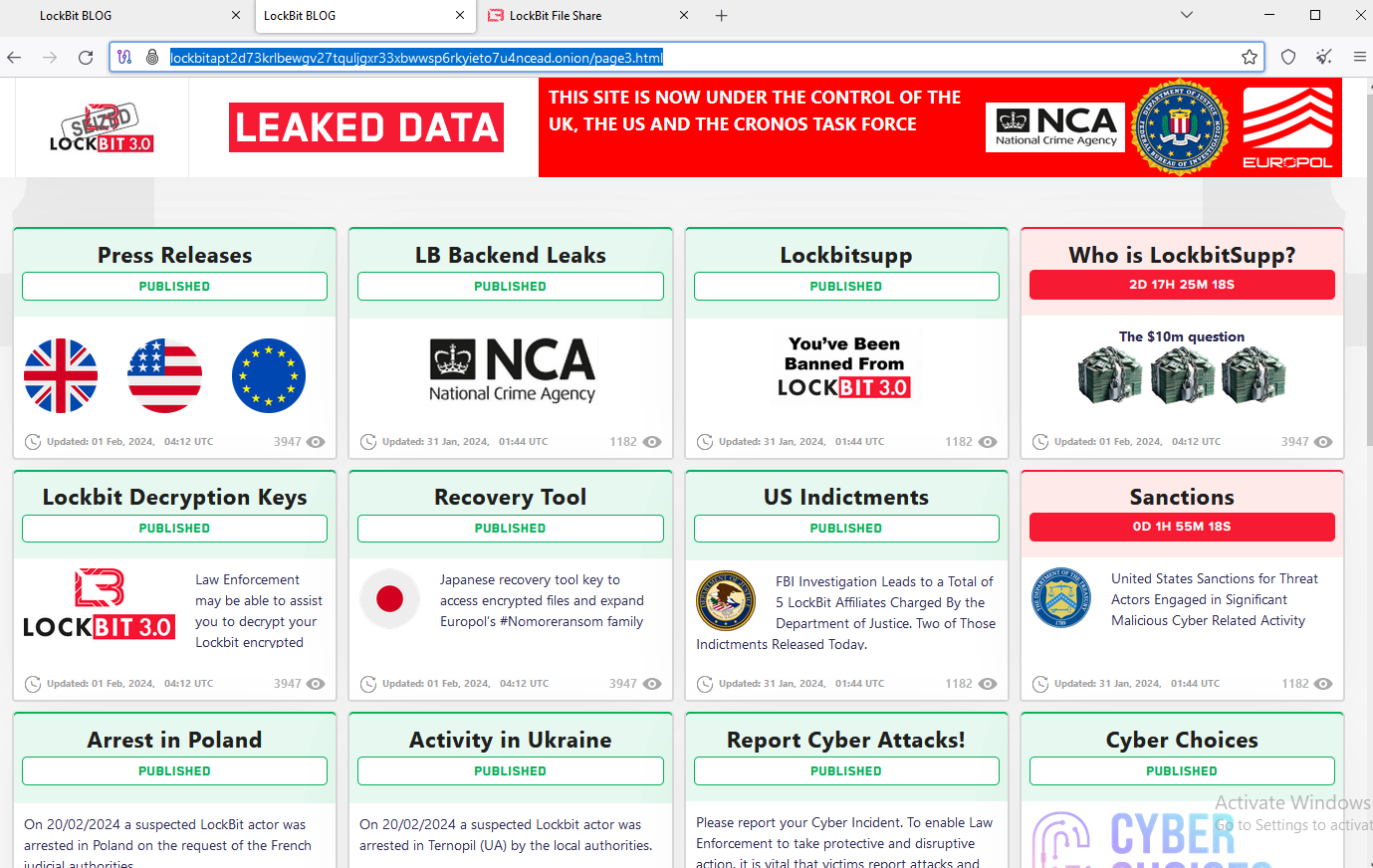
The feds used the existing design on LockBit’s victim shaming website to feature press releases and free decryption tools.
Dubbed “Operation Cronos,” the effort involved the seizure of nearly three-dozen servers; the arrest of two alleged LockBit members; the release of a free LockBit decryption tool; and the freezing of more than 200 cryptocurrency accounts thought to be tied to the gang’s activities. The government says LockBit has claimed more than 2,000 victims worldwide and extorted over $120 million in payments.
In a lengthy, rambling letter published on Feb. 24 and addressed to the FBI, the ransomware group’s leader LockBitSupp announced that their victim shaming websites were once again operational on the dark web, with fresh countdown timers for Fulton County and a half-dozen other recent victims.
“The FBI decided to hack now for one reason only, because they didn’t want to leak information fultoncountyga.gov,” LockBitSupp wrote. “The stolen documents contain a lot of interesting things and Donald Trump’s court cases that could affect the upcoming US election.”
LockBit has already released roughly two dozen files allegedly stolen from Fulton County government systems, although none of them involve Mr. Trump’s criminal trial. But the documents do appear to include court records that are sealed and shielded from public viewing.
George Chidi writes The Atlanta Objective, a Substack publication on crime in Georgia’s capital city. Chidi says the leaked data so far includes a sealed record related to a child abuse case, and a sealed motion in the murder trial of Juwuan Gaston demanding the state turn over confidential informant identities.
Chidi cites reports from a Fulton County employee who said the confidential material includes the identities of jurors serving on the trial of the rapper Jeffery “Young Thug” Williams, who is charged along with five other defendants in a racketeering and gang conspiracy.
“The screenshots suggest that hackers will be able to give any attorney defending a criminal case in the county a starting place to argue that evidence has been tainted or witnesses intimidated, and that the release of confidential information has compromised cases,” Chidi wrote. “Judge Ural Glanville has, I am told by staff, been working feverishly behind the scenes over the last two weeks to manage the unfolding disaster.”
LockBitSupp also denied assertions made by the U.K.’s NCA that LockBit did not delete stolen data as promised when victims agreed to pay a ransom. The accusation is an explosive one because nobody will pay a ransom if they don’t believe the ransomware group will hold up its end of the bargain.
The ransomware group leader also confirmed information first reported here last week, that federal investigators managed to hack LockBit by exploiting a known vulnerability in PHP, a scripting language that is widely used in Web development.
“Due to my personal negligence and irresponsibility I relaxed and did not update PHP in time,” LockBitSupp wrote. “As a result of which access was gained to the two main servers where this version of PHP was installed.”
LockBitSupp’s FBI letter said the group kept copies of its stolen victim data on servers that did not use PHP, and that consequently it was able to retain copies of files stolen from victims. The letter also listed links to multiple new instances of LockBit dark net websites, including the leak page listing Fulton County’s new countdown timer.

LockBit’s new data leak site promises to release stolen Fulton County data on March 2, 2024, unless paid a ransom demand.
“Even after the FBI hack, the stolen data will be published on the blog, there is no chance of destroying the stolen data without payment,” LockBitSupp wrote. “All FBI actions are aimed at destroying the reputation of my affiliate program, my demoralization, they want me to leave and quit my job, they want to scare me because they can not find and eliminate me, I can not be stopped, you can not even hope, as long as I am alive I will continue to do pentest with postpaid.”
In January 2024, LockBitSupp told XSS forum members he was disappointed the FBI hadn’t offered a reward for his doxing and/or arrest, and that in response he was placing a bounty on his own head — offering $10 million to anyone who could discover his real name.
After the NCA and FBI seized LockBit’s site, the group’s homepage was retrofitted with a blog entry titled, “Who is LockBitSupp? The $10M question.” The teaser made use of LockBit’s own countdown timer, and suggested the real identity of LockBitSupp would soon be revealed.
However, after the countdown timer expired the page was replaced with a taunting message from the feds, but it included no new information about LockBitSupp’s identity.
On Feb. 21, the U.S. Department of State announced rewards totaling up to $15 million for information leading to the arrest and/or conviction of anyone participating in LockBit ransomware attacks. The State Department said $10 million of that is for information on LockBit’s leaders, and up to $5 million is offered for information on affiliates.
In an interview with the malware-focused Twitter/X account Vx-Underground, LockBit staff asserted that authorities had arrested a couple of small-time players in their operation, and that investigators still do not know the real-life identities of the core LockBit members, or that of their leader.
“They assert the FBI / NCA UK / EUROPOL do not know their information,” Vx-Underground wrote. “They state they are willing to double the bounty of $10,000,000. They state they will place a $20,000,000 bounty of their own head if anyone can dox them.”
In the weeks leading up to the FBI/NCA takedown, LockBitSupp became embroiled in a number of high-profile personal and business disputes on the Russian cybercrime forums.
Earlier this year, someone used LockBit ransomware to infect the networks of AN-Security, a venerated 30-year-old security and technology company based in St. Petersburg, Russia. This violated the golden rule for cybercriminals based in Russia and former soviet nations that make up the Commonwealth of Independent States, which is that attacking your own citizens in those countries is the surest way to get arrested and prosecuted by local authorities.
LockBitSupp later claimed the attacker had used a publicly leaked, older version of LockBit to compromise systems at AN-Security, and said the attack was an attempt to smear their reputation by a rival ransomware group known as “Clop.” But the incident no doubt prompted closer inspection of LockBitSupp’s activities by Russian authorities.
Then in early February, the administrator of the Russian-language cybercrime forum XSS said LockBitSupp had threatened to have him killed after the ransomware group leader was banned by the community. LockBitSupp was excommunicated from XSS after he refused to pay an arbitration amount ordered by the forum administrator. That dispute related to a complaint from another forum member who said LockBitSupp recently stiffed him on his promised share of an unusually large ransomware payout.
KrebsOnSecurity sought comment from LockBitSupp at the ToX instant messenger ID listed in his letter to the FBI. LockBitSupp declined to elaborate on the unreleased documents from Fulton County, saying the files will be available for everyone to see in a few days.
LockBitSupp said his team was still negotiating with Fulton County when the FBI seized their servers, which is why the county has been granted a time extension. He also denied threatening to kill the XSS administrator.
“I have not threatened to kill the XSS administrator, he is blatantly lying, this is to cause self-pity and damage my reputation,” LockBitSupp told KrebsOnSecurity. “It is not necessary to kill him to punish him, there are more humane methods and he knows what they are.”
Asked why he was so certain the FBI doesn’t know his real-life identity, LockBitSupp was more precise.
“I’m not sure the FBI doesn’t know who I am,” he said. “I just believe they will never find me.”
It seems unlikely that the FBI’s seizure of LockBit’s infrastructure was somehow an effort to stave off the disclosure of Fulton County’s data, as LockBitSupp maintains. For one thing, Europol said the takedown was the result of a months-long infiltration of the ransomware group.
Also, in reporting on the attack’s disruption to the office of Fulton County District Attorney Fani Willis on Feb. 14, CNN reported that by then the intrusion by LockBit had persisted for nearly two and a half weeks.
Finally, if the NCA and FBI really believed that LockBit never deleted victim data, they had to assume LockBit would still have at least one copy of all their stolen data hidden somewhere safe.
Fulton County is still trying to recover systems and restore services affected by the ransomware attack. “Fulton County continues to make substantial progress in restoring its systems following the recent ransomware incident resulting in service outages,” reads the latest statement from the county on Feb. 22. “Since the start of this incident, our team has been working tirelessly to bring services back up.”
Update, Feb. 29, 3:22 p.m. ET: Just hours after this story ran, LockBit changed its countdown timer for Fulton County saying they had until the morning of Feb. 29 (today) to pay a ransonm demand. When the official deadline neared today, Fulton County’s listing was removed from LockBit’s victim shaming website. Asked about the removal of the listing, LockBit’s leader “LockBitSupp” told KrebsOnSecurity that Fulton County paid a ransom demand. County officials have scheduled a press conference on the ransomware attack at 4:15 p.m. ET today.
A new data leak that appears to have come from one of China’s top private cybersecurity firms provides a rare glimpse into the commercial side of China’s many state-sponsored hacking groups. Experts say the leak illustrates how Chinese government agencies increasingly are contracting out foreign espionage campaigns to the nation’s burgeoning and highly competitive cybersecurity industry.
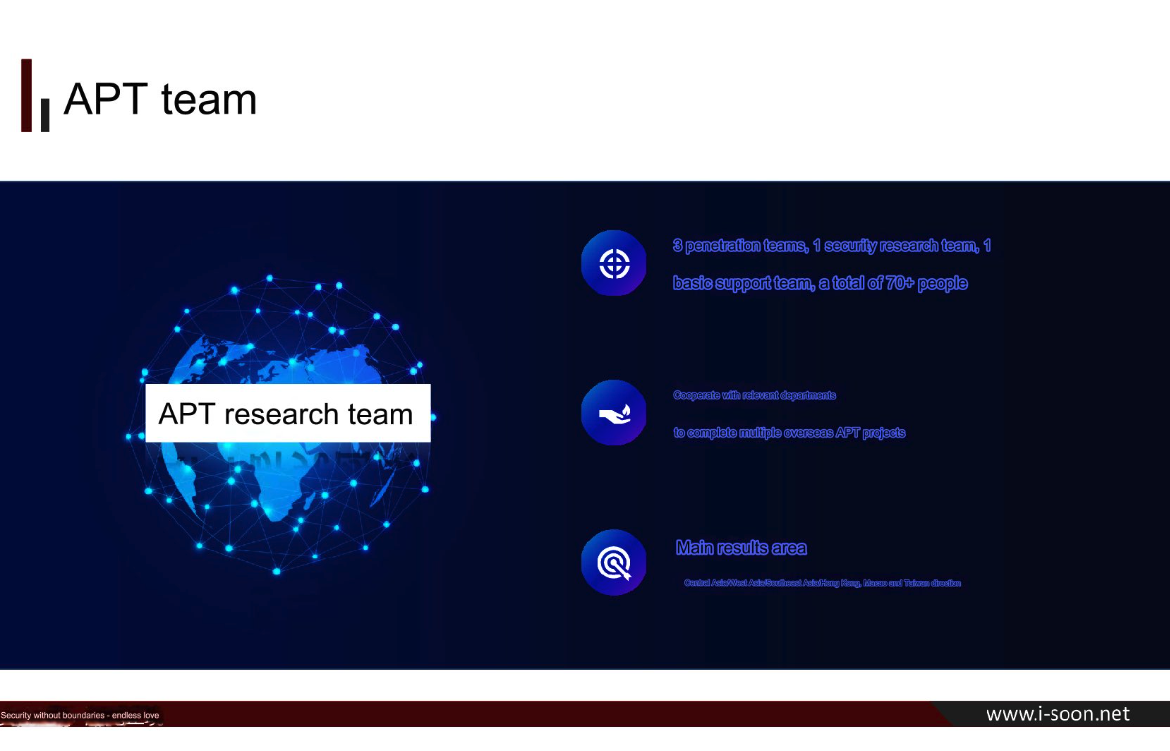
A marketing slide deck promoting i-SOON’s Advanced Persistent Threat (APT) capabilities.
A large cache of more than 500 documents published to GitHub last week indicate the records come from i-SOON, a technology company headquartered in Shanghai that is perhaps best known for providing cybersecurity training courses throughout China. But the leaked documents, which include candid employee chat conversations and images, show a less public side of i-SOON, one that frequently initiates and sustains cyberespionage campaigns commissioned by various Chinese government agencies.
The leaked documents suggest i-SOON employees were responsible for a raft of cyber intrusions over many years, infiltrating government systems in the United Kingdom and countries throughout Asia. Although the cache does not include raw data stolen from cyber espionage targets, it features numerous documents listing the level of access gained and the types of data exposed in each intrusion.
Security experts who reviewed the leaked data say they believe the information is legitimate, and that i-SOON works closely with China’s Ministry of Public Security and the military. In 2021, the Sichuan provincial government named i-SOON as one of “the top 30 information security companies.”
“The leak provides some of the most concrete details seen publicly to date, revealing the maturing nature of China’s cyber espionage ecosystem,” said Dakota Cary, a China-focused consultant at the security firm SentinelOne. “It shows explicitly how government targeting requirements drive a competitive marketplace of independent contractor hackers-for-hire.”
Mei Danowski is a former intelligence analyst and China expert who now writes about her research in a Substack publication called Natto Thoughts. Danowski said i-SOON has achieved the highest secrecy classification that a non-state-owned company can receive, which qualifies the company to conduct classified research and development related to state security.
i-SOON’s “business services” webpage states that the company’s offerings include public security, anti-fraud, blockchain forensics, enterprise security solutions, and training. Danowski said that in 2013, i-SOON established a department for research on developing new APT network penetration methods.
APT stands for Advanced Persistent Threat, a term that generally refers to state-sponsored hacking groups. Indeed, among the documents apparently leaked from i-SOON is a sales pitch slide boldly highlighting the hacking prowess of the company’s “APT research team” (see screenshot above).

i-SOON CEO Wu Haibo, in 2011. Image: nattothoughts.substack.com.
The leaked documents included a lengthy chat conversation between the company’s founders, who repeatedly discuss flagging sales and the need to secure more employees and government contracts. Danowski said the CEO of i-SOON, Wu Haibo (“Shutdown” in the leaked chats) is a well-known first-generation red hacker or “Honker,” and an early member of Green Army — the very first Chinese hacktivist group founded in 1997. Mr. Haibo has not yet responded to a request for comment.
In October 2023, Danowski detailed how i-SOON became embroiled in a software development contract dispute when it was sued by a competing Chinese cybersecurity company called Chengdu 404. In September 2020, the U.S. Department of Justice unsealed indictments against multiple Chengdu 404 employees, charging that the company was a facade that hid more than a decade’s worth of cyber intrusions attributed to a threat actor group known as “APT 41.”
Danowski said the existence of this legal dispute suggests that Chengdu 404 and i-SOON have or at one time had a business relationship, and that one company likely served as a subcontractor to the other.
“From what they chat about we can see this is a very competitive industry, where companies in this space are constantly poaching each others’ employees and tools,” Danowski said. “The infosec industry is always trying to distinguish [the work] of one APT group from another. But that’s getting harder to do.”
It remains unclear if i-SOON’s work has earned it a unique APT designation. But Will Thomas, a cyber threat intelligence researcher at Equinix, found an Internet address in the leaked data that corresponds to a domain flagged in a 2019 Citizen Lab report about one-click mobile phone exploits that were being used to target groups in Tibet. The 2019 report referred to the threat actor behind those attacks as an APT group called Poison Carp.
Several images and chat records in the data leak suggest i-SOON’s clients periodically gave the company a list of targets they wanted to infiltrate, but sometimes employees confused the instructions. One screenshot shows a conversation in which an employee tells his boss they’ve just hacked one of the universities on their latest list, only to be told that the victim in question was not actually listed as a desired target.
The leaked chats show i-SOON continuously tried to recruit new talent by hosting a series of hacking competitions across China. It also performed charity work, and sought to engage employees and sustain morale with various team-building events.
However, the chats include multiple conversations between employees commiserating over long hours and low pay. The overall tone of the discussions indicates employee morale was quite low and that the workplace environment was fairly toxic. In several of the conversations, i-SOON employees openly discuss with their bosses how much money they just lost gambling online with their mobile phones while at work.
Danowski believes the i-SOON data was probably leaked by one of those disgruntled employees.
“This was released the first working day after the Chinese New Year,” Danowski said. “Definitely whoever did this planned it, because you can’t get all this information all at once.”
SentinelOne’s Cary said he came to the same conclusion, noting that the Protonmail account tied to the GitHub profile that published the records was registered a month before the leak, on January 15, 2024.
China’s much vaunted Great Firewall not only lets the government control and limit what citizens can access online, but this distributed spying apparatus allows authorities to block data on Chinese citizens and companies from ever leaving the country.
As a result, China enjoys a remarkable information asymmetry vis-a-vis virtually all other industrialized nations. Which is why this apparent data leak from i-SOON is such a rare find for Western security researchers.
“I was so excited to see this,” Cary said. “Every day I hope for data leaks coming out of China.”
That information asymmetry is at the heart of the Chinese government’s cyberwarfare goals, according to a 2023 analysis by Margin Research performed on behalf of the Defense Advanced Research Projects Agency (DARPA).
“In the area of cyberwarfare, the western governments see cyberspace as a ‘fifth domain’ of warfare,” the Margin study observed. “The Chinese, however, look at cyberspace in the broader context of information space. The ultimate objective is, not ‘control’ of cyberspace, but control of information, a vision that dominates China’s cyber operations.”
The National Cybersecurity Strategy issued by the White House last year singles out China as the biggest cyber threat to U.S. interests. While the United States government does contract certain aspects of its cyber operations to companies in the private sector, it does not follow China’s example in promoting the wholesale theft of state and corporate secrets for the commercial benefit of its own private industries.
Dave Aitel, a co-author of the Margin Research report and former computer scientist at the U.S. National Security Agency, said it’s nice to see that Chinese cybersecurity firms have to deal with all of the same contracting headaches facing U.S. companies seeking work with the federal government.
“This leak just shows there’s layers of contractors all the way down,” Aitel said. “It’s pretty fun to see the Chinese version of it.”
U.S. and U.K. authorities have seized the darknet websites run by LockBit, a prolific and destructive ransomware group that has claimed more than 2,000 victims worldwide and extorted over $120 million in payments. Instead of listing data stolen from ransomware victims who didn’t pay, LockBit’s victim shaming website now offers free recovery tools, as well as news about arrests and criminal charges involving LockBit affiliates.

Investigators used the existing design on LockBit’s victim shaming website to feature press releases and free decryption tools.
Dubbed “Operation Cronos,” the law enforcement action involved the seizure of nearly three-dozen servers; the arrest of two alleged LockBit members; the unsealing of two indictments; the release of a free LockBit decryption tool; and the freezing of more than 200 cryptocurrency accounts thought to be tied to the gang’s activities.
LockBit members have executed attacks against thousands of victims in the United States and around the world, according to the U.S. Department of Justice (DOJ). First surfacing in September 2019, the gang is estimated to have made hundreds of millions of U.S. dollars in ransom demands, and extorted over $120 million in ransom payments.
LockBit operated as a ransomware-as-a-service group, wherein the ransomware gang takes care of everything from the bulletproof hosting and domains to the development and maintenance of the malware. Meanwhile, affiliates are solely responsible for finding new victims, and can reap 60 to 80 percent of any ransom amount ultimately paid to the group.
A statement on Operation Cronos from the European police agency Europol said the months-long infiltration resulted in the compromise of LockBit’s primary platform and other critical infrastructure, including the takedown of 34 servers in the Netherlands, Germany, Finland, France, Switzerland, Australia, the United States and the United Kingdom. Europol said two suspected LockBit actors were arrested in Poland and Ukraine, but no further information has been released about those detained.
The DOJ today unsealed indictments against two Russian men alleged to be active members of LockBit. The government says Russian national Artur Sungatov used LockBit ransomware against victims in manufacturing, logistics, insurance and other companies throughout the United States.
Ivan Gennadievich Kondratyev, a.k.a. “Bassterlord,” allegedly deployed LockBit against targets in the United States, Singapore, Taiwan, and Lebanon. Kondratyev is also charged (PDF) with three criminal counts arising from his alleged use of the Sodinokibi (aka “REvil“) ransomware variant to encrypt data, exfiltrate victim information, and extort a ransom payment from a corporate victim based in Alameda County, California.
With the indictments of Sungatov and Kondratyev, a total of five LockBit affiliates now have been officially charged. In May 2023, U.S. authorities unsealed indictments against two alleged LockBit affiliates, Mikhail “Wazawaka” Matveev and Mikhail Vasiliev.
Vasiliev, 35, of Bradford, Ontario, Canada, is in custody in Canada awaiting extradition to the United States (the complaint against Vasiliev is at this PDF). Matveev remains at large, presumably still in Russia. In January 2022, KrebsOnSecurity published Who is the Network Access Broker ‘Wazawaka,’ which followed clues from Wazawaka’s many pseudonyms and contact details on the Russian-language cybercrime forums back to a 31-year-old Mikhail Matveev from Abaza, RU.
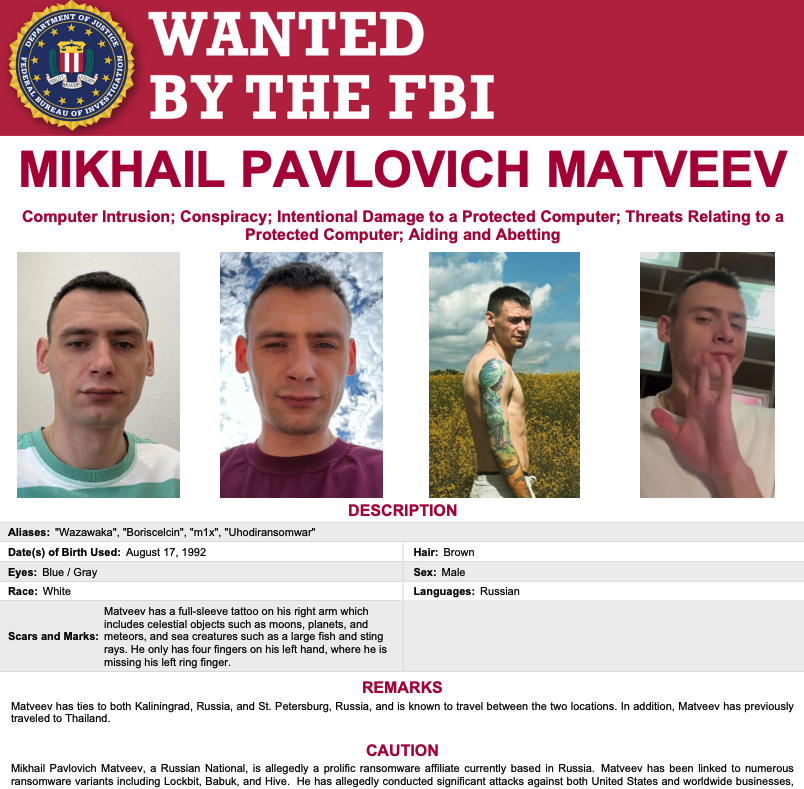
An FBI wanted poster for Matveev.
In June 2023, Russian national Ruslan Magomedovich Astamirov was charged in New Jersey for his participation in the LockBit conspiracy, including the deployment of LockBit against victims in Florida, Japan, France, and Kenya. Astamirov is currently in custody in the United States awaiting trial.
LockBit was known to have recruited affiliates that worked with multiple ransomware groups simultaneously, and it’s unclear what impact this takedown may have on competing ransomware affiliate operations. The security firm ProDaft said on Twitter/X that the infiltration of LockBit by investigators provided “in-depth visibility into each affiliate’s structures, including ties with other notorious groups such as FIN7, Wizard Spider, and EvilCorp.”
In a lengthy thread about the LockBit takedown on the Russian-language cybercrime forum XSS, one of the gang’s leaders said the FBI and the U.K.’s National Crime Agency (NCA) had infiltrated its servers using a known vulnerability in PHP, a scripting language that is widely used in Web development.
Several denizens of XSS wondered aloud why the PHP flaw was not flagged by LockBit’s vaunted “Bug Bounty” program, which promised a financial reward to affiliates who could find and quietly report any security vulnerabilities threatening to undermine LockBit’s online infrastructure.
This prompted several XSS members to start posting memes taunting the group about the security failure.
“Does it mean that the FBI provided a pentesting service to the affiliate program?,” one denizen quipped. “Or did they decide to take part in the bug bounty program? :):)”
Federal investigators also appear to be trolling LockBit members with their seizure notices. LockBit’s data leak site previously featured a countdown timer for each victim organization listed, indicating the time remaining for the victim to pay a ransom demand before their stolen files would be published online. Now, the top entry on the shaming site is a countdown timer until the public doxing of “LockBitSupp,” the unofficial spokesperson or figurehead for the LockBit gang.
“Who is LockbitSupp?” the teaser reads. “The $10m question.”
In January 2024, LockBitSupp told XSS forum members he was disappointed the FBI hadn’t offered a reward for his doxing and/or arrest, and that in response he was placing a bounty on his own head — offering $10 million to anyone who could discover his real name.
“My god, who needs me?,” LockBitSupp wrote on Jan. 22, 2024. “There is not even a reward out for me on the FBI website. By the way, I want to use this chance to increase the reward amount for a person who can tell me my full name from USD 1 million to USD 10 million. The person who will find out my name, tell it to me and explain how they were able to find it out will get USD 10 million. Please take note that when looking for criminals, the FBI uses unclear wording offering a reward of UP TO USD 10 million; this means that the FBI can pay you USD 100, because technically, it’s an amount UP TO 10 million. On the other hand, I am willing to pay USD 10 million, no more and no less.”
Mark Stockley, cybersecurity evangelist at the security firm Malwarebytes, said the NCA is obviously trolling the LockBit group and LockBitSupp.
“I don’t think this is an accident—this is how ransomware groups talk to each other,” Stockley said. “This is law enforcement taking the time to enjoy its moment, and humiliate LockBit in its own vernacular, presumably so it loses face.”
In a press conference today, the FBI said Operation Cronos included investigative assistance from the Gendarmerie-C3N in France; the State Criminal Police Office L-K-A and Federal Criminal Police Office in Germany; Fedpol and Zurich Cantonal Police in Switzerland; the National Police Agency in Japan; the Australian Federal Police; the Swedish Police Authority; the National Bureau of Investigation in Finland; the Royal Canadian Mounted Police; and the National Police in the Netherlands.
The Justice Department said victims targeted by LockBit should contact the FBI at https://lockbitvictims.ic3.gov/ to determine whether affected systems can be successfully decrypted. In addition, the Japanese Police, supported by Europol, have released a recovery tool designed to recover files encrypted by the LockBit 3.0 Black Ransomware.
In 2021, the exclusive Russian cybercrime forum Mazafaka was hacked. The leaked user database shows one of the forum’s founders was an attorney who advised Russia’s top hackers on the legal risks of their work, and what to do if they got caught. A review of this user’s hacker identities shows that during his time on the forums he served as an officer in the special forces of the GRU, the foreign military intelligence agency of the Russian Federation.
Launched in 2001 under the tagline “Network terrorism,” Mazafaka would evolve into one of the most guarded Russian-language cybercrime communities. The forum’s member roster included a Who’s Who of top Russian cybercriminals, and it featured sub-forums for a wide range of cybercrime specialities, including malware, spam, coding and identity theft.
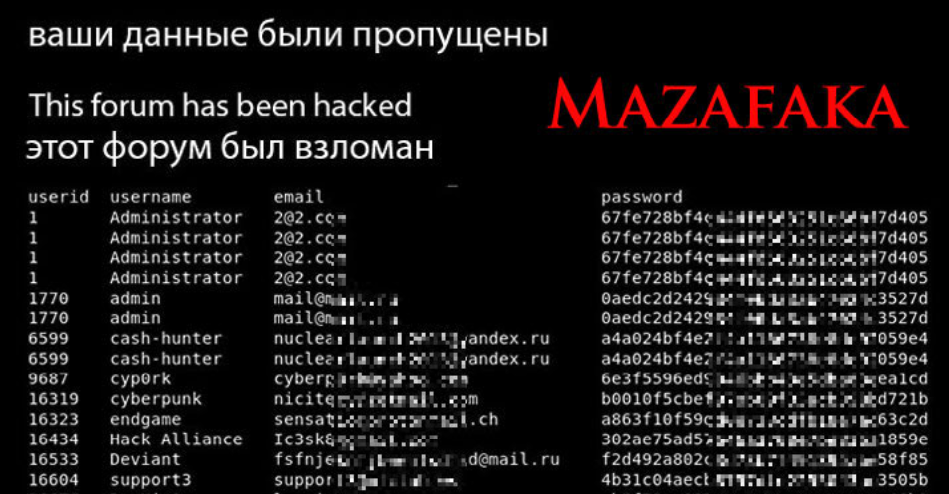
One representation of the leaked Mazafaka database.
In almost any database leak, the first accounts listed are usually the administrators and early core members. But the Mazafaka user information posted online was not a database file per se, and it was clearly edited, redacted and restructured by whoever released it. As a result, it can be difficult to tell which members are the earliest users.
The original Mazafaka is known to have been launched by a hacker using the nickname “Stalker.” However, the lowest numbered (non-admin) user ID in the Mazafaka database belongs to another individual who used the handle “Djamix,” and the email address djamix@mazafaka[.]ru.
From the forum’s inception until around 2008, Djamix was one of its most active and eloquent contributors. Djamix told forum members he was a lawyer, and nearly all of his posts included legal analyses of various public cases involving hackers arrested and charged with cybercrimes in Russia and abroad.
“Hiding with purely technical parameters will not help in a serious matter,” Djamix advised Maza members in September 2007. “In order to ESCAPE the law, you need to KNOW the law. This is the most important thing. Technical capabilities cannot overcome intelligence and cunning.”
Stalker himself credited Djamix with keeping Mazafaka online for so many years. In a retrospective post published to Livejournal in 2014 titled, “Mazafaka, from conception to the present day,” Stalker said Djamix had become a core member of the community.
“This guy is everywhere,” Stalker said of Djamix. “There’s not a thing on [Mazafaka] that he doesn’t take part in. For me, he is a stimulus-irritant and thanks to him, Maza is still alive. Our rallying force!”
Djamix told other forum denizens he was a licensed attorney who could be hired for remote or in-person consultations, and his posts on Mazafaka and other Russian boards show several hackers facing legal jeopardy likely took him up on this offer.
“I have the right to represent your interests in court,” Djamix said on the Russian-language cybercrime forum Verified in Jan. 2011. “Remotely (in the form of constant support and consultations), or in person – this is discussed separately. As well as the cost of my services.”
A search on djamix@mazafaka[.]ru at DomainTools.com reveals this address has been used to register at least 10 domain names since 2008. Those include several websites about life in and around Sochi, Russia, the site of the 2014 Winter Olympics, as well as a nearby coastal town called Adler. All of those sites say they were registered to an Aleksei Safronov from Sochi who also lists Adler as a hometown.
The breach tracking service Constella Intelligence finds that the phone number associated with those domains — +7.9676442212 — is tied to a Facebook account for an Aleksei Valerievich Safronov from Sochi. Mr. Safronov’s Facebook profile, which was last updated in October 2022, says his ICQ instant messenger number is 53765. This is the same ICQ number assigned to Djamix in the Mazafaka user database.

The Facebook account for Aleksey Safronov.
A “Djamix” account on the forum privetsochi[.]ru (“Hello Sochi”) says this user was born Oct. 2, 1970, and that his website is uposter[.]ru. This Russian language news site’s tagline is, “We Create Communication,” and it focuses heavily on news about Sochi, Adler, Russia and the war in Ukraine, with a strong pro-Kremlin bent.
Safronov’s Facebook profile also gives his Skype username as “Djamixadler,” and it includes dozens of photos of him dressed in military fatigues along with a regiment of soldiers deploying in fairly remote areas of Russia. Some of those photos date back to 2008.
In several of the images, we can see a patch on the arm of Safronov’s jacket that bears the logo of the Spetsnaz GRU, a special forces unit of the Russian military. According to a 2020 report from the Congressional Research Service, the GRU operates both as an intelligence agency — collecting human, cyber, and signals intelligence — and as a military organization responsible for battlefield reconnaissance and the operation of Russia’s Spetsnaz military commando units.

Mr. Safronov posted this image of himself on Facebook in 2016. The insignia of the GRU can be seen on his sleeve.
“In recent years, reports have linked the GRU to some of Russia’s most aggressive and public intelligence operations,” the CRS report explains. “Reportedly, the GRU played a key role in Russia’s occupation of Ukraine’s Crimea region and invasion of eastern Ukraine, the attempted assassination of former Russian intelligence officer Sergei Skripal in the United Kingdom, interference in the 2016 U.S. presidential elections, disinformation and propaganda operations, and some of the world’s most damaging cyberattacks.”
According to the Russia-focused investigative news outlet Meduza, in 2014 the Russian Defense Ministry created its “information-operation troops” for action in “cyber-confrontations with potential adversaries.”
“Later, sources in the Defense Ministry explained that these new troops were meant to ‘disrupt the potential adversary’s information networks,'” Meduza reported in 2018. “Recruiters reportedly went looking for ‘hackers who have had problems with the law.'”
Mr. Safronov did not respond to multiple requests for comment. A 2018 treatise written by Aleksei Valerievich Safronov titled “One Hundred Years of GRU Military Intelligence” explains the significance of the bat in the seal of the GRU.
“One way or another, the bat is an emblem that unites all active and retired intelligence officers; it is a symbol of unity and exclusivity,” Safronov wrote. “And, in general, it doesn’t matter who we’re talking about – a secret GRU agent somewhere in the army or a sniper in any of the special forces brigades. They all did and are doing one very important and responsible thing.”
It’s unclear what role Mr. Safronov plays or played in the GRU, but it seems likely the military intelligence agency would have exploited his considerable technical skills, knowledge and connections on the Russian cybercrime forums.
Searching on Safronov’s domain uposter[.]ru in Constella Intelligence reveals that this domain was used in 2022 to register an account at a popular Spanish-language discussion forum dedicated to helping applicants prepare for a career in the Guardia Civil, one of Spain’s two national police forces. Pivoting on that Russian IP in Constella shows three other accounts were created at the same Spanish user forum around the same date.
Mark Rasch is a former cybercrime prosecutor for the U.S. Department of Justice who now serves as chief legal officer for the New York cybersecurity firm Unit 221B. Rasch said there has always been a close relationship between the GRU and the Russian hacker community, noting that in the early 2000s the GRU was soliciting hackers with the skills necessary to hack US banks in order to procure funds to help finance Russia’s war in Chechnya.
“The guy is heavily hooked into the Russian cyber community, and that’s useful for intelligence services,” Rasch said. “He could have been infiltrating the community to monitor it for the GRU. Or he could just be a guy wearing a military uniform.”
Three Americans were charged this week with stealing more than $400 million in a November 2022 SIM-swapping attack. The U.S. government did not name the victim organization, but there is every indication that the money was stolen from the now-defunct cryptocurrency exchange FTX, which had just filed for bankruptcy on that same day.
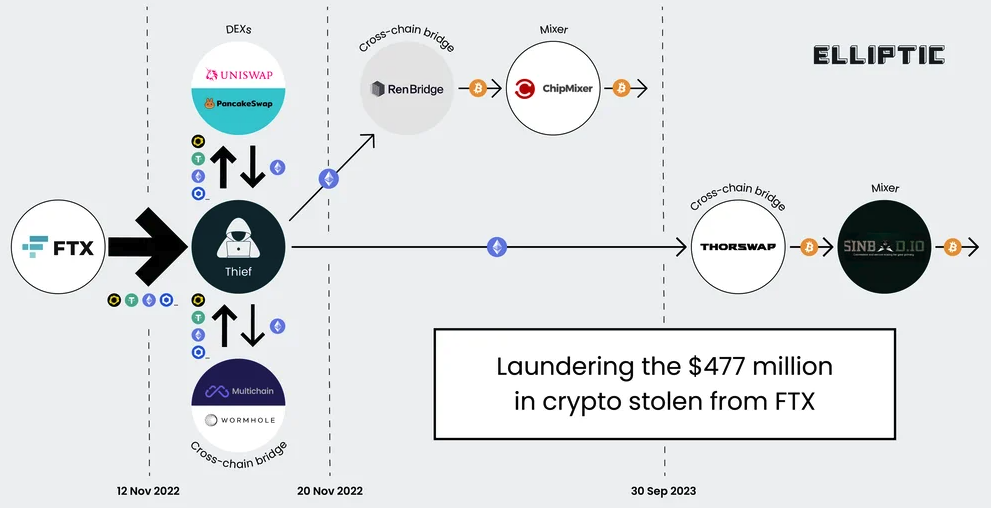
A graphic illustrating the flow of more than $400 million in cryptocurrencies stolen from FTX on Nov. 11-12, 2022. Image: Elliptic.co.
An indictment unsealed this week and first reported on by Ars Technica alleges that Chicago man Robert Powell, a.k.a. “R,” “R$” and “ElSwapo1,” was the ringleader of a SIM-swapping group called the “Powell SIM Swapping Crew.” Colorado resident Emily “Em” Hernandez allegedly helped the group gain access to victim devices in service of SIM-swapping attacks between March 2021 and April 2023. Indiana resident Carter Rohn, a.k.a. “Carti,” and “Punslayer,” allegedly assisted in compromising devices.
In a SIM-swapping attack, the crooks transfer the target’s phone number to a device they control, allowing them to intercept any text messages or phone calls sent to the victim, including one-time passcodes for authentication or password reset links sent via SMS.
The indictment states that the perpetrators in this heist stole the $400 million in cryptocurrencies on Nov. 11, 2022 after they SIM-swapped an AT&T customer by impersonating them at a retail store using a fake ID. However, the document refers to the victim in this case only by the name “Victim 1.”
Wired’s Andy Greenberg recently wrote about FTX’s all-night race to stop a $1 billion crypto heist that occurred on the evening of November 11:
“FTX’s staff had already endured one of the worst days in the company’s short life. What had recently been one of the world’s top cryptocurrency exchanges, valued at $32 billion only 10 months earlier, had just declared bankruptcy. Executives had, after an extended struggle, persuaded the company’s CEO, Sam Bankman-Fried, to hand over the reins to John Ray III, a new chief executive now tasked with shepherding the company through a nightmarish thicket of debts, many of which it seemed to have no means to pay.”
“FTX had, it seemed, hit rock bottom. Until someone—a thief or thieves who have yet to be identified—chose that particular moment to make things far worse. That Friday evening, exhausted FTX staffers began to see mysterious outflows of the company’s cryptocurrency, publicly captured on the Etherscan website that tracks the Ethereum blockchain, representing hundreds of millions of dollars worth of crypto being stolen in real time.”
The indictment says the $400 million was stolen over several hours between November 11 and 12, 2022. Tom Robinson, co-founder of the blockchain intelligence firm Elliptic, said the attackers in the FTX heist began to drain FTX wallets on the evening of Nov. 11, 2022 local time, and continuing until the 12th of November.
Robinson said Elliptic is not aware of any other crypto heists of that magnitude occurring on that date.
“We put the value of the cryptoassets stolen at $477 million,” Robinson said. “The FTX administrators have reported overall losses due to “unauthorized third-party transfers” of $413 million – the discrepancy is likely due to subsequent seizure and return of some of the stolen assets. Either way, it’s certainly over $400 million, and we are not aware of any other thefts from crypto exchanges on this scale, on this date.”
The SIM-swappers allegedly responsible for the $400 million crypto theft are all U.S. residents. But there are some indications they had help from organized cybercriminals based in Russia. In October 2023, Elliptic released a report that found the money stolen from FTX had been laundered through exchanges with ties to criminal groups based in Russia.
“A Russia-linked actor seems a stronger possibility,” Elliptic wrote. “Of the stolen assets that can be traced through ChipMixer, significant amounts are combined with funds from Russia-linked criminal groups, including ransomware gangs and darknet markets, before being sent to exchanges. This points to the involvement of a broker or other intermediary with a nexus in Russia.”
Nick Bax, director of analytics at the cryptocurrency wallet recovery firm Unciphered, said the flow of stolen FTX funds looks more like what his team has seen from groups based in Eastern Europe and Russian than anything they’ve witnessed from US-based SIM-swappers.
“I was a bit surprised by this development but it seems to be consistent with reports from CISA [the Cybersecurity and Infrastructure Security Agency] and others that “Scattered Spider” has worked with [ransomware] groups like ALPHV/BlackCat,” Bax said.
CISA’s alert on Scattered Spider says they are a cybercriminal group that targets large companies and their contracted information technology (IT) help desks.
“Scattered Spider threat actors, per trusted third parties, have typically engaged in data theft for extortion and have also been known to utilize BlackCat/ALPHV ransomware alongside their usual TTPs,” CISA said, referring to the group’s signature “Tactics, Techniques an Procedures.”
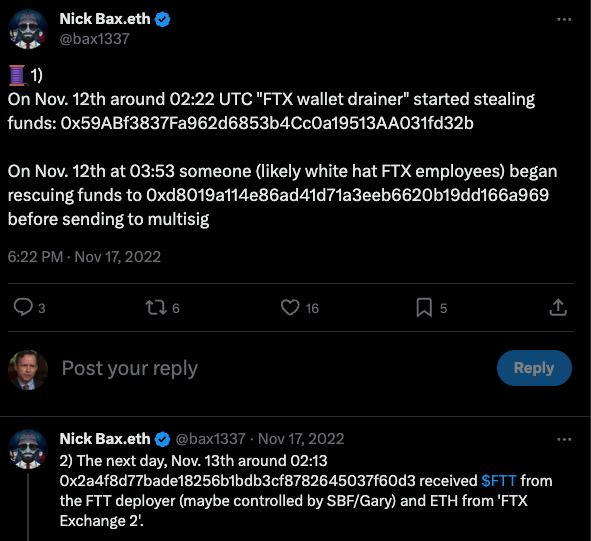
Nick Bax, posting on Twitter/X in Nov 2022 about his research on the $400 million FTX heist.
Earlier this week, KrebsOnSecurity published a story noting that a Florida man recently charged with being part of a SIM-swapping conspiracy is thought to be a key member of Scattered Spider, a hacking group also known as 0ktapus. That group has been blamed for a string of cyber intrusions at major U.S. technology companies during the summer of 2022.
Financial claims involving FTX’s bankruptcy proceedings are being handled by the financial and risk consulting giant Kroll. In August 2023, Kroll suffered its own breach after a Kroll employee was SIM-swapped. According to Kroll, the thieves stole user information for multiple cryptocurrency platforms that rely on Kroll services to handle bankruptcy proceedings.
KrebsOnSecurity sought comment for this story from Kroll, the FBI, the prosecuting attorneys, and Sullivan & Cromwell, the law firm handling the FTX bankruptcy. This story will be updated in the event any of them respond.
Attorneys for Mr. Powell said they do not know who Victim 1 is in the indictment, as the government hasn’t shared that information yet. Powell’s next court date is a detention hearing on Feb. 2, 2024.
Update, Feb. 3, 12:19 p.m. ET: The FBI declined a request to comment.
On Jan. 9, 2024, U.S. authorities arrested a 19-year-old Florida man charged with wire fraud, aggravated identity theft, and conspiring with others to use SIM-swapping to steal cryptocurrency. Sources close to the investigation tell KrebsOnSecurity the accused was a key member of a criminal hacking group blamed for a string of cyber intrusions at major U.S. technology companies during the summer of 2022.
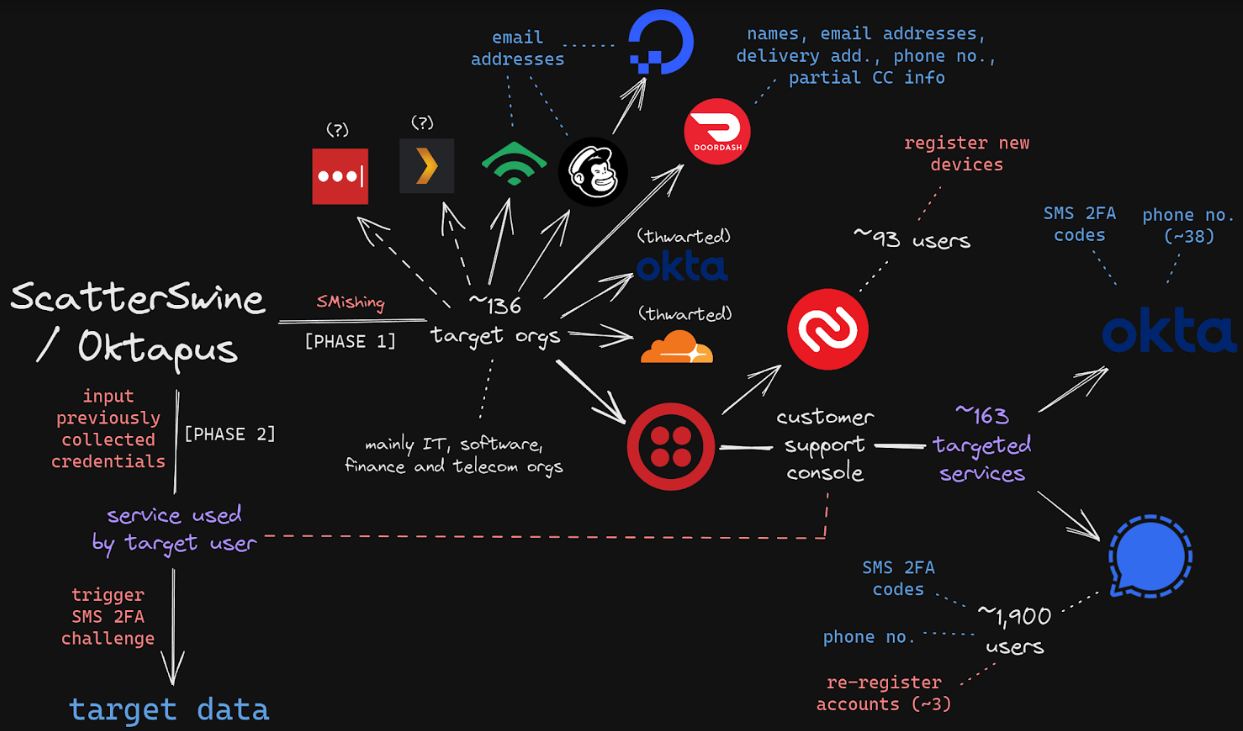
A graphic depicting how 0ktapus leveraged one victim to attack another. Image credit: Amitai Cohen of Wiz.
Prosecutors say Noah Michael Urban of Palm Coast, Fla., stole at least $800,000 from at least five victims between August 2022 and March 2023. In each attack, the victims saw their email and financial accounts compromised after suffering an unauthorized SIM-swap, wherein attackers transferred each victim’s mobile phone number to a new device that they controlled.
The government says Urban went by the aliases “Sosa” and “King Bob,” among others. Multiple trusted sources told KrebsOnSecurity that Sosa/King Bob was a core member of a hacking group behind the 2022 breach at Twilio, a company that provides services for making and receiving text messages and phone calls. Twilio disclosed in Aug. 2022 that an intrusion had exposed a “limited number” of Twilio customer accounts through a sophisticated social engineering attack designed to steal employee credentials.
Shortly after that disclosure, the security firm Group-IB published a report linking the attackers behind the Twilio intrusion to separate breaches at more than 130 organizations, including LastPass, DoorDash, Mailchimp, and Plex. Multiple security firms soon assigned the hacking group the nickname “Scattered Spider.”
Group-IB dubbed the gang by a different name — 0ktapus — which was a nod to how the criminal group phished employees for credentials. The missives asked users to click a link and log in at a phishing page that mimicked their employer’s Okta authentication page. Those who submitted credentials were then prompted to provide the one-time password needed for multi-factor authentication.

A booking photo of Noah Michael Urban released by the Volusia County Sheriff.
0ktapus used newly-registered domains that often included the name of the targeted company, and sent text messages urging employees to click on links to these domains to view information about a pending change in their work schedule. The phishing sites used a Telegram instant message bot to forward any submitted credentials in real-time, allowing the attackers to use the phished username, password and one-time code to log in as that employee at the real employer website.
0ktapus often leveraged information or access gained in one breach to perpetrate another. As documented by Group-IB, the group pivoted from its access to Twilio to attack at least 163 of its customers. Among those was the encrypted messaging app Signal, which said the breach could have let attackers re-register the phone number on another device for about 1,900 users.
Also in August 2022, several employees at email delivery firm Mailchimp provided their remote access credentials to this phishing group. According to an Aug. 12 blog post, the attackers used their access to Mailchimp employee accounts to steal data from 214 customers involved in cryptocurrency and finance.
On August 25, 2022, the password manager service LastPass disclosed a breach in which attackers stole some source code and proprietary LastPass technical information, and weeks later LastPass said an investigation revealed no customer data or password vaults were accessed.
However, on November 30, 2022 LastPass disclosed a far more serious breach that the company said leveraged data stolen in the August breach. LastPass said criminal hackers had stolen encrypted copies of some password vaults, as well as other personal information.
In February 2023, LastPass disclosed that the intrusion involved a highly complex, targeted attack against a DevOps engineer who was one of only four LastPass employees with access to the corporate vault. In that incident, the attackers exploited a security vulnerability in a Plex media server that the employee was running on his home network, and succeeded in installing malicious software that stole passwords and other authentication credentials. The vulnerability exploited by the intruders was patched back in 2020, but the employee never updated his Plex software.
As it happens, Plex announced its own data breach one day before LastPass disclosed its initial August intrusion. On August 24, 2022, Plex’s security team urged users to reset their passwords, saying an intruder had accessed customer emails, usernames and encrypted passwords.
A review of thousands of messages that Sosa and King Bob posted to several public forums and Discord servers over the past two years shows that the person behind these identities was mainly focused on two things: Sim-swapping, and trading in stolen, unreleased rap music recordings from popular artists.
Indeed, those messages show Sosa/King Bob was obsessed with finding new “grails,” the slang term used in some cybercrime discussion channels to describe recordings from popular artists that have never been officially released. It stands to reason that King Bob was SIM-swapping important people in the music industry to obtain these files, although there is little to support this conclusion from the public chat records available.
“I got the most music in the com,” King Bob bragged in a Discord server in November 2022. “I got thousands of grails.”
King Bob’s chats show he was particularly enamored of stealing the unreleased works of his favorite artists — Lil Uzi Vert, Playboi Carti, and Juice Wrld. When another Discord user asked if he has Eminem grails, King Bob said he was unsure.
“I have two folders,” King Bob explained. “One with Uzi, Carti, Juicewrld. And then I have ‘every other artist.’ Every other artist is unorganized as fuck and has thousands of random shit.”
King Bob’s posts on Discord show he quickly became a celebrity on Leaked[.]cx, one of most active forums for trading, buying and selling unreleased music from popular artists. The more grails that users share with the Leaked[.]cx community, the more their status and access on the forum grows.
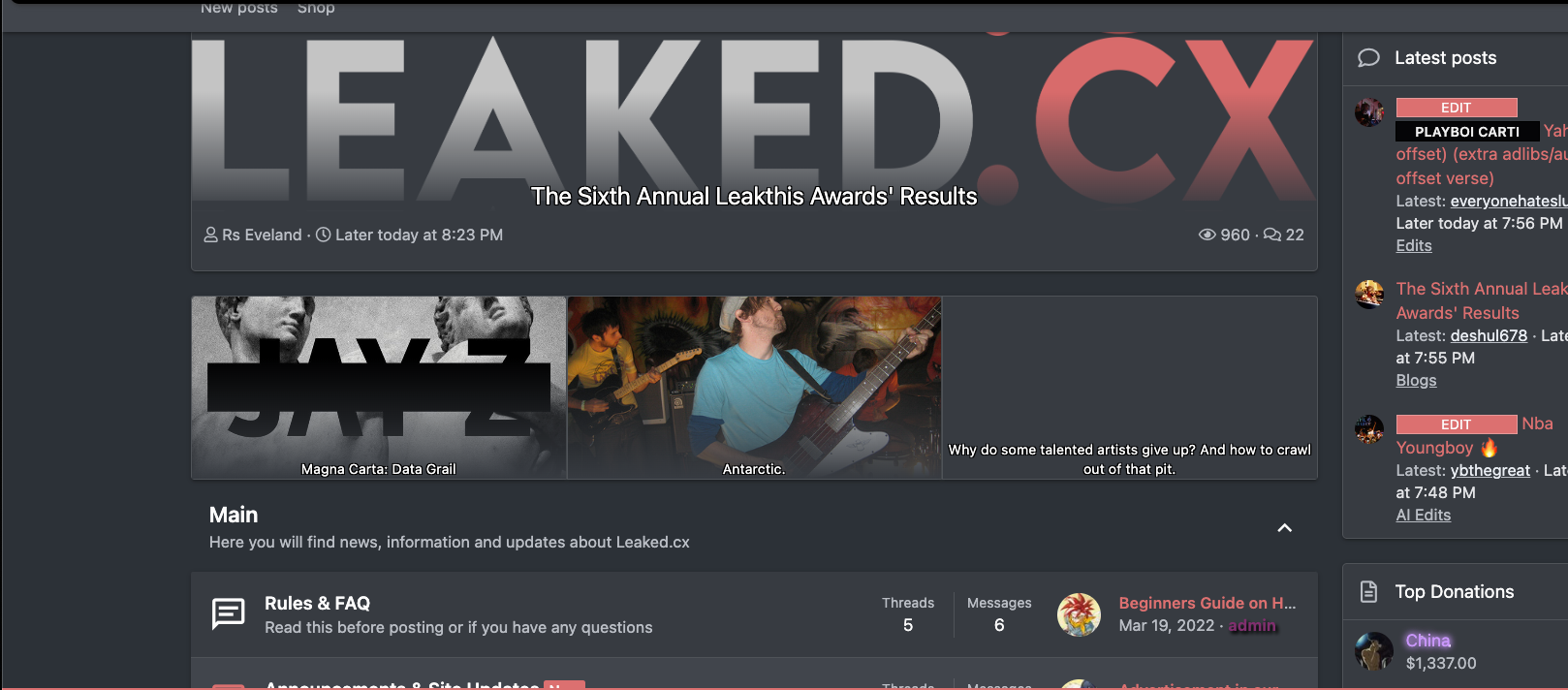
The last cache of Leaked dot cx indexed by the archive.org on Jan. 11, 2024.
And King Bob shared a large number of his purloined tunes with this community. Still others he tried to sell. It’s unclear how many of those sales were ever consummated, but it is not unusual for a prized grail to sell for anywhere from $5,000 to $20,000.
In mid-January 2024, several Leaked[.]cx regulars began complaining that they hadn’t seen King Bob in a while and were really missing his grails. On or around Jan. 11, the same day the Justice Department unsealed the indictment against Urban, Leaked[.]cx started blocking people who were trying to visit the site from the United States.
Days later, frustrated Leaked[.]cx users speculated about what could be the cause of the blockage.
“Probs blocked as part of king bob investigation i think?,” wrote the user “Plsdontarrest.” “Doubt he only hacked US artists/ppl which is why it’s happening in multiple countries.”
On Sept. 21, 2022, KrebsOnSecurity told the story of a “Foreshadow,” the nickname chosen by a Florida teenager who was working for a SIM-swapping crew when he was abducted, beaten and held for a $200,000 ransom. A rival SIM-swapping group claimed that Foreshadow and his associates had robbed them of their fair share of the profits from a recent SIM-swap.
In a video released by his abductors on Telegram, a bloodied, battered Foreshadow was made to say they would kill him unless the ransom was paid.
As I wrote in that story, Foreshadow appears to have served as a “holder” — a term used to describe a low-level member of any SIM-swapping group who agrees to carry out the riskiest and least rewarding role of the crime: Physically keeping and managing the various mobile devices and SIM cards that are used in SIM-swapping scams.
KrebsOnSecurity has since learned that Foreshadow was a holder for a particularly active SIM-swapper who went by “Elijah,” which was another nickname that prosecutors say Urban used.

Shortly after Foreshadow’s hostage video began circulating on Telegram and Discord, multiple known actors in the SIM-swapping space told everyone in the channels to delete any previous messages with Foreshadow, claiming he was fully cooperating with the FBI.
This was not the first time Sosa and his crew were hit with violent attacks from rival SIM-swapping groups. In early 2022, a video surfaced on a popular cybercrime channel purporting to show attackers hurling a brick through a window at an address that matches the spacious and upscale home of Urban’s parents in Sanford, Fl.
“Brickings” are among the “violence-as-a-service” offerings broadly available on many cybercrime channels. SIM-swapping and adjacent cybercrime channels are replete with job offers for in-person assignments and tasks that can be found if one searches for posts titled, “If you live near,” or “IRL job” — short for “in real life” job.
A number of these classified ads are in service of performing brickings, where someone is hired to visit a specific address and toss a brick through the target’s window. Other typical IRL job offers involve tire slashings and even drive-by shootings.
Sosa was known to be a top member of the broader cybercriminal community online known as “The Com,” wherein hackers boast loudly about high-profile exploits and hacks that almost invariably begin with social engineering — tricking people over the phone, email or SMS into giving away credentials that allow remote access to corporate internal networks.
Sosa also was active in a particularly destructive group of accomplished criminal SIM-swappers known as “Star Fraud.” Cyberscoop’s AJ Vicens reported last year that individuals within Star Fraud were likely involved in the high-profile Caesars Entertainment an MGM Resorts extortion attacks.
“ALPHV, an established ransomware-as-a-service operation thought to be based in Russia and linked to attacks on dozens of entities, claimed responsibility for Caesars and MGM attacks in a note posted to its website earlier this month,” Vicens wrote. “Experts had said the attacks were the work of a group tracked variously as UNC 3944 or Scattered Spider, which has been described as an affiliate working with ALPHV made up of people in the United States and Britain who excel at social engineering.”
In February 2023, KrebsOnSecurity published data taken from the Telegram channels for Star Fraud and two other SIM-swapping groups showing these crooks focused on SIM-swapping T-Mobile customers, and that they collectively claimed access to T-Mobile on 100 separate occasions over a 7-month period in 2022.
The SIM-swapping groups were able to switch targeted phone numbers to another device on demand because they constantly phished T-Mobile employees into giving up credentials to employee-only tools. In each of those cases the goal was the same: Phish T-Mobile employees for access to internal company tools, and then convert that access into a cybercrime service that could be hired to divert any T-Mobile user’s text messages and phone calls to another device.
Allison Nixon, chief research officer at the New York cybersecurity consultancy Unit 221B, said the increasing brazenness of many Com members is a function of how long it has taken federal authorities to go after guys like Sosa.
“These incidents show what happens when it takes too long for cybercriminals to get arrested,” Nixon said. “If governments fail to prioritize this source of threat, violence originating from the Internet will affect regular people.”
The Daytona Beach News-Journal reports that Urban was arrested Jan. 9 and his trial is scheduled to begin in the trial term starting March 4 in Jacksonville. The publication said the judge overseeing Urban’s case denied bail because the defendant was a strong flight risk.
At Urban’s arraignment, it emerged that he had no fixed address and had been using an alias to stay at an Airbnb. The judge reportedly said that when a search warrant was executed at Urban’s residence, the defendant was downloading programs to delete computer files.
What’s more, the judge explained, despite telling authorities in May that he would not have any more contact with his co-conspirators and would not engage in cryptocurrency transactions, he did so anyway.
Urban entered a plea of not guilty. Urban’s court-appointed attorney said her client would have no comment at this time.
Prosecutors charged Urban with eight counts of wire fraud, one count of conspiracy to commit wire fraud, and five counts of aggravated identity theft. According to the government, if convicted Urban faces up to 20 years in federal prison on each wire fraud charge. He also faces a minimum mandatory penalty of two years in prison for the aggravated identity offenses, which will run consecutive to any other prison sentence imposed.
Authorities in Australia, the United Kingdom and the United States this week levied financial sanctions against a Russian man accused of stealing data on nearly 10 million customers of the Australian health insurance giant Medibank. 33-year-old Aleksandr Ermakov allegedly stole and leaked the Medibank data while working with one of Russia’s most destructive ransomware groups, but little more is shared about the accused. Here’s a closer look at the activities of Mr. Ermakov’s alleged hacker handles.

Aleksandr Ermakov, 33, of Russia. Image: Australian Department of Foreign Affairs and Trade.
The allegations against Ermakov mark the first time Australia has sanctioned a cybercriminal. The documents released by the Australian government included multiple photos of Mr. Ermakov, and it was clear they wanted to send a message that this was personal.
It’s not hard to see why. The attackers who broke into Medibank in October 2022 stole 9.7 million records on current and former Medibank customers. When the company refused to pay a $10 million ransom demand, the hackers selectively leaked highly sensitive health records, including those tied to abortions, HIV and alcohol abuse.
The U.S. government says Ermakov and the other actors behind the Medibank hack are believed to be linked to the Russia-backed cybercrime gang REvil.
“REvil was among the most notorious cybercrime gangs in the world until July 2021 when they disappeared. REvil is a ransomware-as-a-service (RaaS) operation and generally motivated by financial gain,” a statement from the U.S. Department of the Treasury reads. “REvil ransomware has been deployed on approximately 175,000 computers worldwide, with at least $200 million paid in ransom.”
The sanctions say Ermakov went by multiple aliases on Russian cybercrime forums, including GustaveDore, JimJones, and Blade Runner. A search on the handle GustaveDore at the cyber intelligence platform Intel 471 shows this user created a ransomware affiliate program in November 2021 called Sugar (a.k.a. Encoded01), which focused on targeting single computers and end-users instead of corporations.
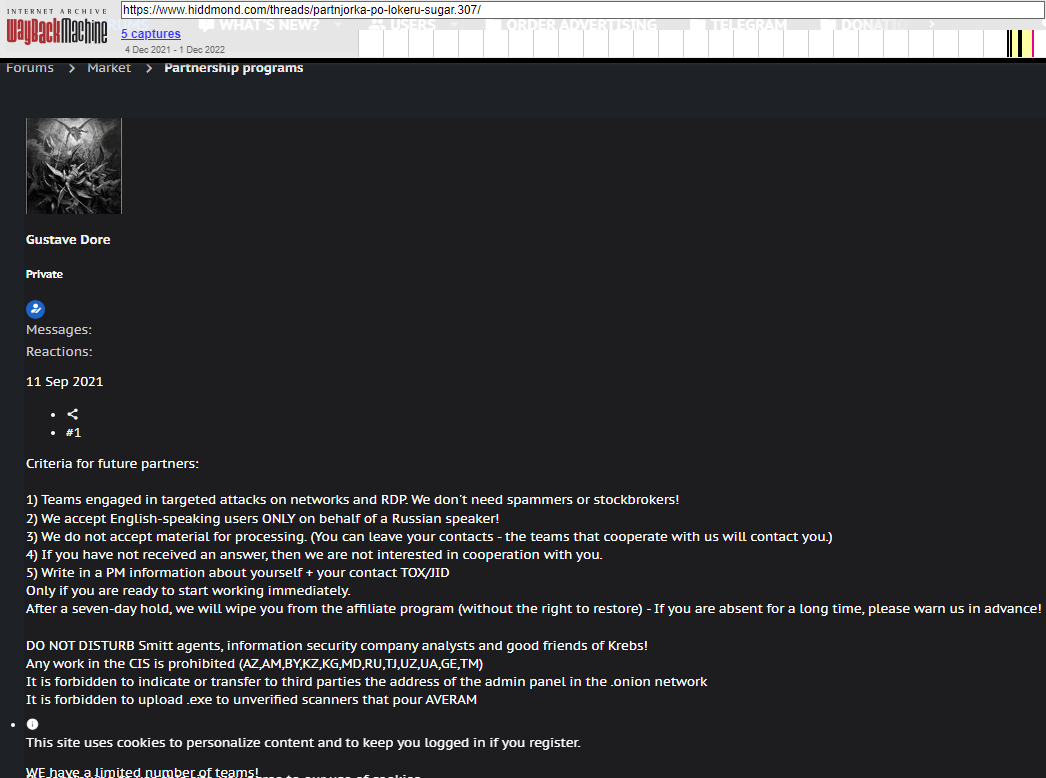
An ad for the ransomware-as-a-service program Sugar posted by GustaveDore warns readers against sharing information with security researchers, law enforcement, or “friends of Krebs.”
In November 2020, Intel 471 analysts concluded that GustaveDore’s alias JimJones “was using and operating several different ransomware strains, including a private undisclosed strain and one developed by the REvil gang.”
In 2020, GustaveDore advertised on several Russian discussion forums that he was part of a Russian technology firm called Shtazi, which could be hired for computer programming, web development, and “reputation management.” Shtazi’s website remains in operation today.

A Google-translated version of Shtazi dot ru. Image: Archive.org.
The third result when one searches for shtazi[.]ru in Google is an Instagram post from a user named Mikhail Borisovich Shefel, who promotes Shtazi’s services as if it were also his business. If this name sounds familiar, it’s because in December 2023 KrebsOnSecurity identified Mr. Shefel as “Rescator,” the cybercriminal identity tied to tens of millions of payment cards that were stolen in 2013 and 2014 from big box retailers Target and Home Depot, among others.
How close was the connection between GustaveDore and Mr. Shefel? The Treasury Department’s sanctions page says Ermakov used the email address ae.ermak@yandex.ru. A search for this email at DomainTools.com shows it was used to register just one domain name: millioner1[.]com. DomainTools further finds that a phone number tied to Mr. Shefel (79856696666) was used to register two domains: millioner[.]pw, and shtazi[.]net.
The December 2023 story here that outed Mr. Shefel as Rescator noted that Shefel recently changed his last name to “Lenin” and had launched a service called Lenin[.]biz that sells physical USSR-era Ruble notes bearing the image of Vladimir Lenin, the founding father of the Soviet Union. The Instagram account for Mr. Shefel includes images of stacked USSR-era Ruble notes, as well as multiple links to Shtazi.

The Instagram account of Mikhail Borisovich Shefel, aka MikeMike aka Rescator.
Intel 471’s research revealed Ermakov was affiliated in some way with REvil because the stolen Medibank data was published on a blog that had one time been controlled by REvil affiliates who carried out attacks and paid an affiliate fee to the gang.
But by the time of the Medibank hack, the REvil group had mostly scattered after a series of high-profile attacks led to the group being disrupted by law enforcement. In November 2021, Europol announced it arrested seven REvil affiliates who collectively made more than $230 million worth of ransom demands since 2019. At the same time, U.S. authorities unsealed two indictments against a pair of accused REvil cybercriminals.
“The posting of Medibank’s data on that blog, however, indicated a connection with that group, although the connection wasn’t clear at the time,” Intel 471 wrote. “This makes sense in retrospect, as Ermakov’s group had also been a REvil affiliate.”
It is easy to dismiss sanctions like these as ineffective, because as long as Mr. Ermakov remains in Russia he has little to fear of arrest. However, his alleged role as an apparent top member of REvil paints a target on him as someone who likely possesses large sums of cryptocurrency, said Patrick Gray, the Australian co-host and founder of the security news podcast Risky Business.
“I’ve seen a few people poo-poohing the sanctions…but the sanctions component is actually less important than the doxing component,” Gray said. “Because this guy’s life just got a lot more complicated. He’s probably going to have to pay some bribes to stay out of trouble. Every single criminal in Russia now knows he is a vulnerable 33 year old with an absolute ton of bitcoin. So this is not a happy time for him.”
Update, Feb. 21, 1:10 p.m. ET: The Russian security firm F.A.C.C.T reports that Ermakov has been arrested in Russia, and charged with violating domestic laws that prohibit the creation, use and distribution of malicious computer programs.
“During the investigation, several defendants were identified who were not only promoting their ransomware, but also developing custom-made malicious software, creating phishing sites for online stores, and driving user traffic to fraudulent schemes popular in Russia and the CIS,” F.A.C.C.T. wrote. “Among those detained was the owner of the nicknames blade_runner, GistaveDore, GustaveDore, JimJones.”
The rapper and social media personality Punchmade Dev is perhaps best known for his flashy videos singing the praises of a cybercrime lifestyle. With memorable hits such as “Internet Swiping” and “Million Dollar Criminal” earning millions of views, Punchmade has leveraged his considerable following to peddle tutorials on how to commit financial crimes online. But until recently, there wasn’t much to support a conclusion that Punchmade was actually doing the cybercrime things he promotes in his songs.

Images from Punchmade Dev’s Twitter/X account show him displaying bags of cash and wearing a functional diamond-crusted payment card skimmer.
Punchmade Dev’s most controversial mix — a rap called “Wire Fraud Tutorial” — was taken down by Youtube last summer for violating the site’s rules. Punchmade shared on social media that the video’s removal was prompted by YouTube receiving a legal process request from law enforcement officials.
The 24-year-old rapper told reporters he wasn’t instructing people how to conduct wire fraud, but instead informing his fans on how to avoid being victims of wire fraud. However, this is difficult to discern from listening to the song, which sounds very much like a step-by-step tutorial on how to commit wire fraud.
“Listen up, I’m finna show y’all how to hit a bank,” Wire Fraud Tutorial begins. “Just pay attention, this is a quick way to jug in any state. First you wanna get a bank log from a trusted site. Do your research because the information must be right.”
And even though we’re talking about an individual who regularly appears in videos wearing a half-million dollars worth of custom jewelry draped around his arm and neck (including the functional diamond-encrusted payment card skimming device pictured above), there’s never been much evidence that Punchmade was actually involved in committing cybercrimes himself. Even his most vocal critics acknowledged that the whole persona could just be savvy marketing.
That changed recently when Punchmade’s various video and social media accounts began promoting a new web shop that is selling stolen payment cards and identity data, as well as hacked financial accounts and software for producing counterfeit checks.

Punchmade Dev’s shop.
The official Punchmadedev account on Instagram links to many of the aforementioned rap videos and tutorials on cybercriming, as well as to Punchmadedev’s other profiles and websites. Among them is mainpage[.]me/punchmade, which includes the following information for “Punchmade Empire ®”
-212,961 subscribers
#1 source on Telegram
Contact: @whopunchmade
24/7 shop: https://punchmade[.]atshop[.]io
Visiting that @whopunchmade Telegram channel shows this user is promoting punchmade[.]atshop[.]io, which is currently selling hacked bank accounts and payment cards with high balances.
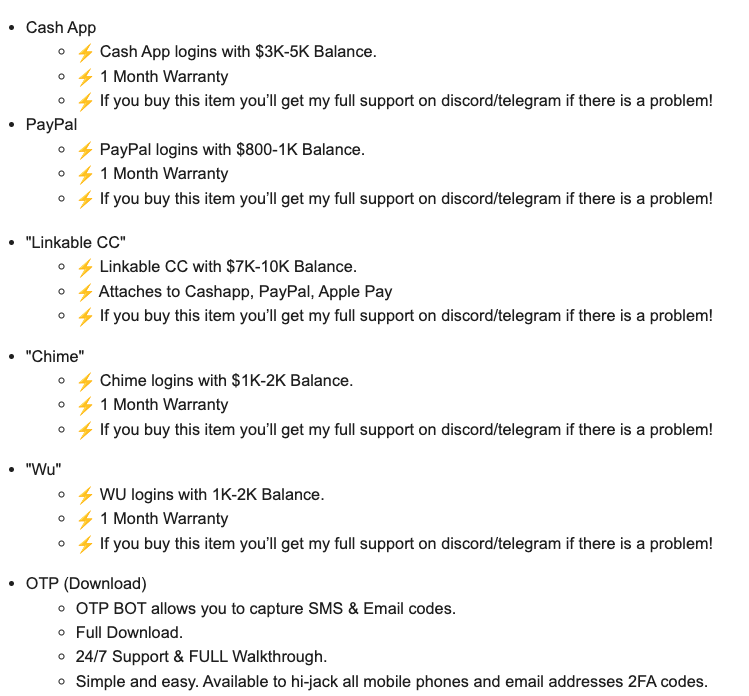
Clicking “purchase” on the C@sh App offering, for example, shows that for $80 the buyer will receive logins to Cash App accounts with balances between $3,000 and $5,000. “If you buy this item you’ll get my full support on discord/telegram if there is a problem!,” the site promises. Purchases can be made in cryptocurrencies, and checking out prompts one to continue payment at Coinbase.com.
Another item for sale, “Fullz + Linkable CC,” promises “ID Front + Back, SSN with 700+ Credit Score, and Linkable CC” or credit card. That also can be had for $80 in crypto.
Punchmade has fashioned his public persona around a collection of custom-made, diamond-covered necklaces that are as outlandish and gaudy as they are revelatory. My favorite shot from one of Punchmade’s videos features at least three of these monstrosities: One appears to be a boring old diamond and gold covered bitcoin, but the other two necklaces tell us something about where Punchmade is from:

Notice the University of Kentucky logo, and the Lexington, Ky skyline.
One of them includes the logo and mascot of the University of Kentucky. The other, an enormous diamond studded skyline, appears to have been designed based on the skyline in Lexington, Ky:

The “About” page on Punchmade Dev’s Spotify profile describes him as “an American artist, rapper, musician, producer, director, entrepreneur, actor and investor.” “Punchmade Dev is best known for his creative ways to use technology, video gaming, and social media to build a fan base,” the profile continues.
The profile explains that he launched his own record label in 2021 called Punchmade Records, where he produces his own instrumentals and edits his own music videos.
A search on companies that include the name “punchmade” at the website of the Kentucky Secretary of State brings up just one record: OBN Group LLC, in Lexington, Ky. This November 2021 record includes a Certificate of Assumed Name, which shows that Punchmade LLC is the assumed name of OBN Group LLC.
The president of OBN Group LLC is listed as Devon Turner. A search on the Secretary of State website for other businesses tied to Devon Turner reveals just one other record: A now-defunct entity called DevTakeFlightBeats Inc.
The breach tracking service Constella Intelligence finds that Devon Turner from Lexington, Ky. used the email address obndevpayments@gmail.com. A lookup on this email at DomainTools.com shows it was used to register the domain foreverpunchmade[.]com, which is registered to a Devon Turner in Lexington, Ky. A copy of this site at archive.org indicates it once sold Punchmade Dev-branded t-shirts and other merchandise.
Mr. Turner did not respond to multiple requests for comment.
Searching online for Devon Turner and “Punchmade” brings up a video from @brainjuiceofficial, a YouTube channel that focuses on social media celebrities. @Brainjuiceofficial says Turner was born in October 2000, the oldest child of a single mother of five whose husband was not in the picture.

Devon Turner, a.k.a. “Punchmade Dev,” in an undated photo.
The video says the six-foot five Turner played basketball, track and football in high school, but that he gradually became obsessed with playing the video game NBA 2K17 and building a following of people watching him play the game competitively online.
According to this brief documentary, Turner previously streamed his NBA 2K17 videos on a YouTube channel called DevTakeFlight, although he originally went by the nickname OBN Dev.
“Things may eventually catch up to Devon if he isn’t careful,” @Brainjuiceofficial observed, noting that Turner has been shot at before, and also robbed at an ATM while flexing a bunch of cash for a picture and wearing $500k in jewelry. “Although you have a lot of people that are into what you do, there are a lot of people waiting for you to slip up.”